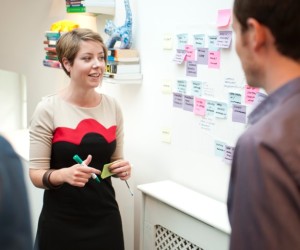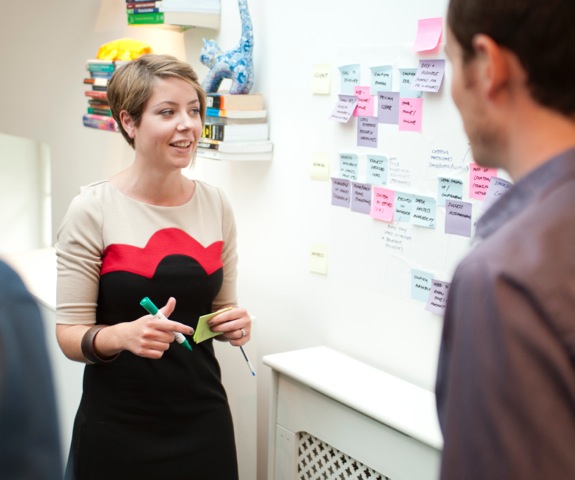 We’ve been bringing you a range of insights into the workplace in Scotland over the past few weeks, talking to professionals in the technology industry, the creative sector and specialisms like HR. This week’s interview is with Alexa Haynes, an experience designer based in Edinburgh, who told us about how she got into usability and what it takes to make it in this field…
We’ve been bringing you a range of insights into the workplace in Scotland over the past few weeks, talking to professionals in the technology industry, the creative sector and specialisms like HR. This week’s interview is with Alexa Haynes, an experience designer based in Edinburgh, who told us about how she got into usability and what it takes to make it in this field…
Name: Dr. Alexa Haynes
Occupation: Senior Experience Designer
Company: Nile
Location: Edinburgh
For those not familiar with the term, how would you describe experience design?
It’s a funny one because as with all these terms there can be a few definitions…ultimately though I find it useful to describe experience design as the practice of examining a service (or process or product) from the user’s point of view and making design decisions that enhance that experience. The objective is to make the service more useable, useful, effective and enjoyable.
At the same time, experience design also helps the businesses or organisations that provide those services to better organise themselves to deliver them more effectively and efficiently. It’s a bit of a cliché but, when it’s done well, it really is a win-win.
How important was your academic (psychology) background in gaining your current job?
Having a background in psychology has been really useful but it is not essential. An important part of my job at Nile is to gather and analyse user insight, so Psychology helps me to understand how people behave and relate to services or processes or products. That understanding plays a big part in the design process.
After my first degree in Psychology, I did a PhD in Usability Engineering at Edinburgh University. It helped me to sharpen my research and analytical skills, run longitudinal studies, and work with a commercial client. I was able to bring that experience into my role.
Is it possible to get into experience design/usability from a more vocational background, such as marketing or graphic design?
Yes, of course. A psychology background is helpful, but it is just one element. Experience design is a multi-disciplinary practice. It requires a range of skills and types of approach. Understanding human behaviour is just one of those. Skills like graphic design, marketing and copywriting are also really important, and you also have to actually be good with people in practice as well as on paper.
Aside from design skills and an understanding of consumer behaviour, what other key skills/attributes are essential in this field?
This might sound strange but I think empathy is essential; both in terms of relating to the user and their needs but also the business and understanding their objectives. It is very much a balancing act between these two. Enthusiasm and persuasion skills are also key. Often, you have to convince a variety of stakeholders of the benefit and value of your suggestions or designs.
Ultimately, good experience design comes from good user insight. So research skills are also essential, as it’s not all about designing a solution. You need to gather evidence, discover user needs goals and motivations to inform your designs and create stakeholder buy-in, which can effectively be done through user research. This can vary from face-to-face interviews, usability sessions, eyetracking, focus groups, workshops and ethnography.
Being able to work in a multi-disciplinary team is also vital. You have to be able to clearly communicate the results of research, and your opinions. And you have to do so in the context of solving the business problem/design challenge at hand.
You have specialised in mobile devices, including apps for the iPad; can you describe the usual process/stages involved in designing an app based on user experience?
From an experience designer’s perspective, designing an app is very much focused on the context of use. You really need to understand what problem this app/service is going to solve for the user first off. Then you need to think about the interface, and what has to happen on the interface in order for the user to complete their task. Then run your design through several iterations with users so you can refine it to produce something that is desirable, usable and efficient.
Please describe a typical day at Nile.
After the obligatory cup of tea and quick natter we usually settle down to reading what’s hot in digital, responding to clients’ requests or questions. Then it’s either analysing some insight from research the previous week or designing how we’ll run the next lot of research with the next client. We can get through a lot of post-its, and coloured sharpies!
What do you see as the next step for your career? Would you consider going into a more managerial role?
Naturally I think it may happen over the years, however I love to talk to people and find out about their lives so I don’t think I could see myself moving away from the practical insight work.
Although at face value, some of the projects may seem mundane – for example, helping to improve an application form for a mortgage – it is still helping to improve lives.
That may sound a little grandiose, but think about it like this: if we improve your experience of doing something that is inherently stressful and at the same time empower you to feel confident in your decisions, then that is a really worthwhile and satisfying thing to do. These things can be subtle and work on an unconscious level but those incremental improvements can really add up.
Do you have any further tips for anyone wanting to get into usability/experience design in Scotland?
I think the best advice is to be proactive. Get out there and engage with consultancies, look into online or short courses if you need to improve your skills. Read up what the trends are and what people are talking about. Follow us on Twitter @NileSays – we not only share our thoughts on what’s happening out there but are also involved in BIMA and Service Design events.
Are you thinking of a career in experience design? Perhaps you have some usability experience of your own to share? Let us know what you think of Alexa’s insights in the comments below.


